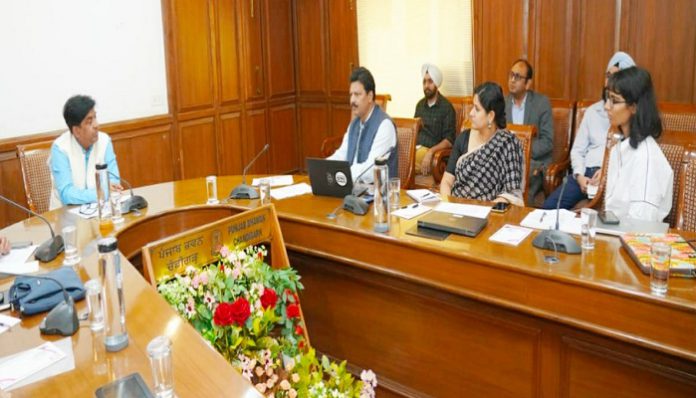
Chandigarh : Under the dynamic leadership of Chief Minister Bhagwant Mann, Punjab is committed to provide clean drinking water and sanitation facilities to the rural areas of Punjab. Department of Water Supply & Sanitation (DWSS) Punjab has initiated many large scale endeavorsto achieve this objective.
Continuing the efforts to speed up implementation of water supply projects in the state, Water Supply and Sanitation Minister Bram Shanker Jimpa chaired a high level meeting with the World Bank Team and Department officers, wherein he stressed the need to scale up implementation of the Water and Sanitation related projects, so that better service delivery can be ensured to the consumers at economical and affordable rates.
World Bank team briefed the Minister about the help and financial assistance provided by it and explained that DWSS and World Bank have jointly done extensive efforts that have transformed the lives of rural people – by making drinking water available at their doorsteps, and reducing the disease burden.
DK Tiwari, Principal Secretary DWSS apprised the Minister that the department has commissioned one large surface water supply project in Moga with the cost of Rs. 218 crore that is providing clean drinking water to nearly 3.54 lac residents of 85 villages of district Moga with the financial assistance by World Bank. Further, He also apprised that the department is also implementing 15 more such projects in districts Amritsar, Gurdaspur, Tarn Taran, Ferozpur, Fazilka, Hoshairpur, Patiala, Ropar and Fatehgarh Sahib. Of these, five projects are World Bank assisted and 10 projects are NABARD assisted. Total cost of these projects is Rs. 1700 Crore. These projects will provide safe drinking water to 24.42 lac people.
Jimpa directed that these projects be commissioned as per schedule and maintained to the best standards ensuring sustainability by involving public participation and awareness campaign to educate public be launched. The Minister also instructed that the department should study best practices followed in other states for operation and maintenance and adopt these in Punjab to improve the overall O&M and sustainability of water supply schemes in the long run.
He emphasized that the public and public representatives must be involved in the entire process of implementation of these projects, so that the benefit might reach at the grassroots level. He also envisioned that all rural citizens in Punjab should be provided with clean water supply from dawn to dusk. This would not only have health benefits but would considerably improve the standard of living in our villages.



